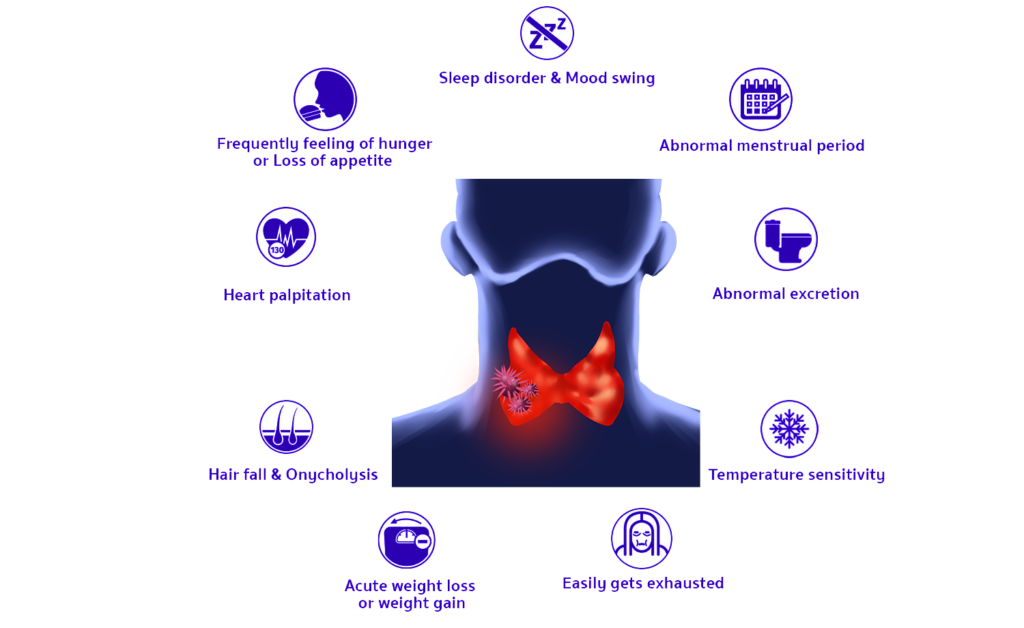Thyroid imbalances, regardless of whether they are hyper or hypo, can have a profound impact on both physical and emotional well-being. Although conventional medicine is effective, Traditional Chinese Medicine (TCM) takes a holistic approach by considering the balance of yin and yang energies in the body. In TCM, the pulse is considered more than just a measure of heart rate; it provides useful information into the body’s internal functions. Practitioners can identify patterns of imbalance by evaluating the quality, rhythm, and depth of the pulse. In this blog post, we’ll look into the basics of thyroid health from a TCM perspective, highlighting the significance of achieving balance between yin and yang for overall well-being.
Exploring Thyroid Imbalance:
The thyroid gland is essential for maintaining a healthy metabolism, energy levels, and overall vitality. When the thyroid is overactive, it leads to hyperthyroidism, which is marked by symptoms like a fast heartbeat, weight loss, and feelings of anxiety. On the other hand, hypothyroidism happens when the thyroid doesn’t produce enough hormones, resulting in tiredness, weight gain, and feeling down.
According to Five Element Theory, each element is associated with particular organs, emotions, and qualities. As an example, the thyroid gland is connected to the water element, which governs the kidneys and is associated with fear and willpower. Imbalances in the water element can lead to thyroid disorders, which indicate disruptions in the body’s regulatory systems.
The body’s balance is understood by considering the relationship of yin and yang energies. The concept of Yin and Yang includes both the nourishing, cooling, passive aspects and the active, warming, transformative forces. Having optimal health requires a careful equilibrium between yin and yang. When both of these energies are in balance, well-being is achieved, but imbalances can result in illness and discomfort.
Hyperthyroidism:
Hyperthyroidism, the pulse can be fast and strong, suggesting an excess of yang energy, which can lead to signs of heat, restlessness, and increased metabolic function. According to TCM, this condition indicates an imbalance where yang dominates over yin. Treatment strategies highlight the importance of nourishing yin to balance out the excess yang. This is typically achieved through the use of cooling herbs, acupuncture, and dietary adjustments.
Hypothyroidism:
In hypothyroidism, the pulse may be slow and weak, indicating a lack of yang energy and an excess of yin energy, resulting in symptoms such as fatigue, sensitivity to cold, and a slow metabolism. TCM deals with hypothyroidism by balancing the body’s energy and promoting healthy circulation. Utilizing a combination of warm, stimulating herbs, acupuncture, and lifestyle adjustments, our approach aims to bring back balance and rejuvenation.
Acupuncture and Thyroid Health:
Acupuncture, an essential part of Traditional Chinese Medicine (TCM), provides a gentle approach to restore the balance of energies and activate the body’s natural healing abilities. Acupuncture focuses on specific points to help regulate thyroid function, relieve symptoms, and restore balance.
Regarding dietary considerations:
It is important to note that in Traditional Chinese Medicine (TCM), the food we consume plays a crucial role in maintaining the delicate balance between yin and yang energies, as well as supporting the health of the thyroid gland. Highlighting the importance of incorporating nutrient-rich foods like leafy greens, root vegetables, and protein-rich foods can support a healthy metabolism and enhance overall well-being. It is recommended that individuals with hyperthyroidism avoid consuming excessive amounts of spicy, greasy, or processed foods that can contribute to heat and dampness in the body.
Practices for a Balanced Lifestyle:
In addition to herbal remedies and acupuncture, making adjustments to your lifestyle is crucial for achieving yin-yang harmony. Practices like meditation, yoga, and relaxation assist in developing inner balance, reduce stress, and promote overall well-being. Emphasizing the importance of getting enough rest, managing stress, and engaging in mindful movement supports a comprehensive approach to maintaining thyroid health.
Conclusion:
Thyroid disorders can be quite challenging for one’s health and well-being, but Traditional Chinese Medicine (TCM) offers a comprehensive approach to understanding and treating these imbalances. Through the utilization of pulse-based diagnosis, yin/yang dynamics, and five element theory, individuals are able to begin on an inspiring journey towards healing and wholeness. Through the integration of ancient wisdom and modern insights, we can develop adaptability, regain equilibrium, and flourish in accordance with the natural world.
-Written by Division of Research and Development, Neubotz Technologies, for Nadifit.




Hey there! I’ve beeen following your web site for some tim now and
finally got the courage to go ahead and give you a shout out from
Porter Tx! Jusst wanted to tell you keep up the great job! https://zeleniymis.Com.ua
Hey there!I’ve been following your web site for some time now and
finally got the courage to go ahead and give yyou a shout out from Porter Tx!
Jusst wanted to ell you kewep up the great job!